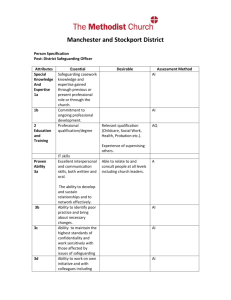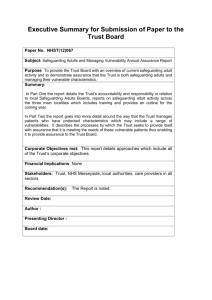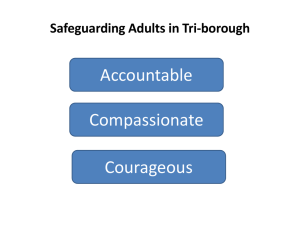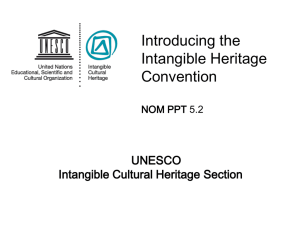The Convention for the Safeguarding of the Intangible
advertisement
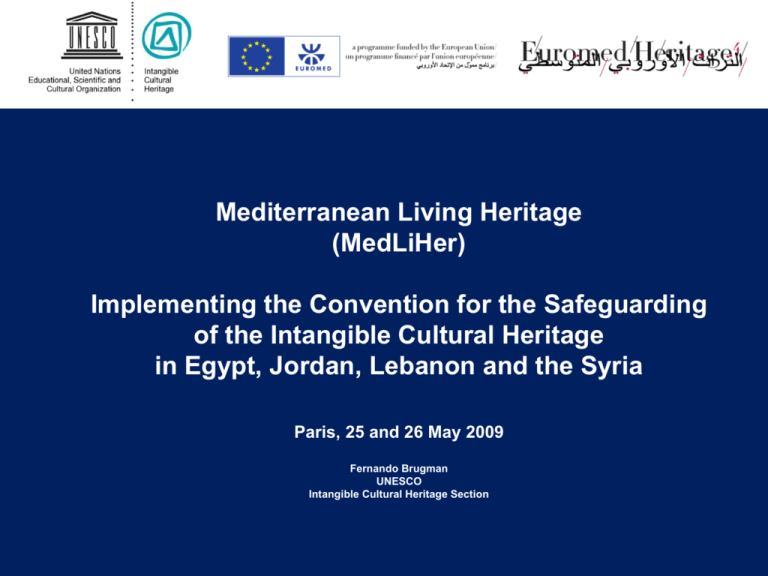
Mediterranean Living Heritage (MedLiHer) Implementing the Convention for the Safeguarding of the Intangible Cultural Heritage in Egypt, Jordan, Lebanon and the Syria Paris, 25 and 26 May 2009 Fernando Brugman UNESCO Intangible Cultural Heritage Section The ICH Convention • Adopted: October 2003 • Open for ratification since November 2003 • Ratified by 30 States: 20 January 2006 • Entered into force: 20 April 2006 • Ratified now by 112 States: The Al-Sirah Al-Hilaliyyah Epic, Egypt Egypt: 03.08.08 (ratification) Jordan: 24.03.06 (ratification) Lebanon: 08.01.07 (acceptance) Syria: 11.03.05 (ratification) Vietnamese Court Music Nha Nhac The Cultural Space of Sosso-Bala in Nyagassola, Guinea Defining ICH: Expressions and practices, knowledge and skills that • are recognised by communities, groups, and in some cases individuals, as forming part of their cultural heritage • are living, transmitted from generation to generation and constantly recreated • are crucial for the sense of identity and continuity of communities and groups • are in conformity with human rights (+ sustainable development) • (belong to one or more of the relevant domains) The definition also includes objects and spaces that are associated with manifestations of ICH Domains • Oral traditions and expressions, including language as a vehicle of the ICH • Performing arts The Traditional Music of Morin Khuur Mongolia • Social practices, rituals and festive events • Knowledge and practices concerning nature and the universe • Traditional craftsmanship Goals • Safeguarding ICH: ensuring its viability (continued enactment and transmission) within communities/groups • Awareness-raising • Sharing and celebrating • Dialogue, respect for cultural diversity • International cooperation and assistance Role of States Parties The Garifuna Language, Dance and Music, Nicaragua • Take necessary measures to ensure safeguarding (= ensure the viability of ICH) • Identify and define elements of intangible heritage, with participation of communities, groups and NGO’s National Safeguarding Measures Shashmaqom Music Tajikistan - Uzbekistan • Inventory making • Adopt a general safeguarding policy • Establish competent safeguarding bodies • Foster studies and research methodologies • Adopt legal, technical, administrative and financial measures • Education, awareness-raising and promotion Mechanism of the Convention • General Assembly of States Parties • Intergovernmental Committee for the Safeguarding of the Intangible Cultural Heritage • Representative List of the Intangible Cultural Heritage of Humanity • List of Intangible Cultural Heritage in Need of Urgent Safeguarding • Programmes, projects and activities reflecting the principles and objectives of the Convention • Fund for the Safeguarding of the Intangible Cultural Heritage • International assistance and cooperation General Assembly • Sovereign Body of the Convention • ordinary session every two years, and in extraordinary sessions • Elects the members of the Committee • Approves the Operational Directives for the implementation of the Convention • 27-29 June 2006: 1 GA • 9 November: 1 EXT GA • 16-19 June 2008: 2 GA The Al-Sirah Al-Hilaliyyah Epic, Egypt Intergovernmental Committee • • • • • • • • • • 24 Members 4-year term, renewal of half of the members every 2 years Membership: determined by equitable geographical representation and rotation Members to send experts as their representatives Algeria: 1 COM (Nov.2006) China: 1 EXT COM (May 2007) Japan: 2 COM (Sept. 2007) Bulgaria: 2 EXT COM (Feb. 2008) Istanbul: 3 EXT COM (Nov. 2008) ABU DHABI: 28/9-2/10 2009 The Art of Akyns, Kyrgyz Epic Tellers Kyrgyzstan Functions of the Committee • Prepare Operational Directives for implementation • Implement the Convention The Pansori Epic Chant Republic of Korea – Examine requests for: • inscription on the Lists • Article 18 • international assistance – Make recommendations on safeguarding measures – Seek means of increasing its resources – Examine periodic reports of States Parties The Fund: International Assistance • International Assistance: – Safeguarding of heritage inscribed on the Urgent Safeguarding List – Preparation of inventories – Programmes, projects and other activities in the States Parties (incl. capacity building) – Preparatory assistance Congos of Villa Mella Dominican Republic Features of the Convention – Introduces a list system for visibility and safeguarding; other main focus on programmes and projects – Deals with heritage representative for communities (not of outstanding universal value) – Emphasis on living heritage, enacted by people, often collectively, mostly transmitted orally – Attention for processes/conditions rather than products – Role of communities/groups – Contribution to promotion of creativity and diversity, to well-being (of communities and groups and societies at large) and peaceful development Implementation: Operational Directives • The Convention creates new mechanisms for the safeguarding of ICH, but does not provide specific instructions on how to implement them. • The Operational Directives serve as guidance for implementing the Convention • The Convention requests the Committee to prepare operational directives for the implementation of the Convention and submit them to the General Assembly for its approval • First set adopted by the General Assembly in June 2008 Operational Directives Contents Contents Safeguarding intangible cultural heritage Urgent Safeguarding List Representative List Incorporation “Masterpieces” into the Representative List Programmes, projects and activities that best reflect the principles and objectives of the Convention Intangible Cultural Heritage Fund and International Assistance Guidelines for the use of the resources of the Fund International assistance Participation in the implementation of the Convention Participation of communities, groups and, where applicable, individuals, as well as experts, centres of expertise and research institutes Non-governmental organizations and the Convention Reports by States Parties on the implementation of the Convention Urgent Safeguarding List Representative List Urgent Safeguarding List Take appropriate safeguarding measures for ICH in danger Representative List Ensure better visibility of the ICH and awareness of its significance Encourage dialogue which respects cultural diversity • No simultaneous inscription on the Urgent Safeguarding List and Representative List • An element could be transferred from one List to the other when complying with all criteria of that List and following the nomination procedure • An element shall be removed from the Lists when it does not any longer satisfy criteria Criteria List Criteria UL RL U.1 R.1 The element constitutes intangible cultural heritage as defined in Article 2 of the Convention for the Safeguarding of the Intangible Cultural Heritage. X X U.2. a) The element is in urgent need of safeguarding because its viability is at risk despite the efforts of the community, group or, if applicable, individuals and State(s) Party(ies) concerned. (or) b) The element is in extremely urgent need of safeguarding because it is facing grave threats as a result of which it cannot be expected to survive without immediate safeguarding. R.2. Inscription of the element will contribute to ensuring visibility, awareness of the significance of the intangible cultural heritage and dialogue, thus reflecting cultural diversity worldwide and testifying to human creativity. U.3. Safeguarding measures are elaborated that may enable the community, group or, if applicable, individuals concerned to continue the practice and transmission of the element. R.3. Safeguarding measures are elaborated that may protect and promote the element. U.4. R.4. The element has been nominated following the widest possible participation of the community, group or, if applicable, individuals concerned and with their free, prior and informed consent. U.5. R.5. U.6. X The element is included in an inventory of the intangible cultural heritage present in the territory(ies) of the submitting State(s) Party(ies). In cases of extreme urgency, the State(s) Party(ies) concerned has (have) been consulted regarding inscription of the element in conformity with Article 17.3 of the Convention. Adopted by the General Assembly at its second session (June 2008) X X X X X X X X Two Lists: Nomination procedure Urgent Safeguarding List 1. Preparatory Assistance Representative List Deadline: 1 September 2. Preparation/Submission Community involvement in the preparation of their nomination Multi-national nominations Evaluate the nomination as quickly as possible after its submission May be brought to the attention by any other State Party, by the community concerned or by an advisory organization. Extreme urgency 3. Examination/Recommendation • Conformity with the inscription criteria • The viability of the element and the feasibility and sufficiency of the safeguarding plan. • Subsidiary body • Conformity with the inscription criteria • The risk of its disappearing 4. Evaluation/Decision If not inscribed No resubmision: 4 years Two Lists For inscription in 2009 Urgent Safeguarding List Deadline for the submission 15 Mar 2009 Number of files received 15 Representative List Deadline for the submission 30 Sep 2008 Number of files received 111 Number of States submitting files 35 Number of multinational files 4 Article 18: Programmes, projects and activities for the safeguarding of ICH National, subregional and regional programmes, projects and activities best reflecting the principles and objectives of this Convention will be selected and promoted Special attention is given to: • the needs of developing countries • the principle of equitable geographic distribution Encourage submission of: • subregional or regional programmes, projects and activities • programmes, projects and activities undertaken jointly by States Parties in geographically discontinuous areas • Proposals characterized by international cooperation and/or focusing on specific priority aspects of safeguarding. Programmes, projects and activities Criteria • Defined in Article 2.3 of the Convention • Promote the coordination at regional, subregional and/or international levels • Reflect the principles and objectives of the Convention • Demonstrate effectiveness in contributing to the viability of the ICH concerned (completed) • Demonstrate reasonable expectation for the contribution to substantially to the viability (underway or planned) • Implemented with the participation of the community, group or, if applicable, individuals concerned • Serve as a subregional, regional or international model • Willing to cooperate in the dissemination of best practices • Feature experiences that are susceptible to an assessment of their results • Applicable to the particular needs of developing countries Timeframe Preparatory Assistance Deadline for submission Decisions to be taken Article 18 USL 1 Oct 2008 (2009) 1 Sep 2009 (2010) 1 Sep 2010 (2011) 1 Oct 2008 (2009) 1 Oct 2008 (2010) 1 Sep 2009 (2011) 1 Mar 2009 (2009) 1 Mar 2010 (2010) 1 Mar 2011 (2011) 15 Mar 2009 (2009) 30 Sep 2008 31 Mar 2009 (2010) 31 Aug 2009 31 Mar 2010 (2011) 31 Aug 2010 September 2009 September 2010 September 2011 RL Sep 2009 Sep 2010 Sep 2011 The Use of the Resources of the Fund Category of Expenditure % Jul 2008 to Dec 2009 Jan 2009 to Jun 2010 International assistance 70 1,347,346 449,132 Emergency assistance 8 153,988 51,329 Other functions of the Committee 3 57,746 19,249 Participation in the Committee sessions of Committee Members from developing countries 5 96,243 32,081 Participation in the Committee sessions of States Parties from developing countries 3 57,746 19,249 Cost of advisory services 4 76,994 25,665 Participation of public or private bodies invited by the Committee 2 38,497 12,832 Reserve Fund 5 96,243 32,081 International Assistance Purposes and Budget International Assistance: 70% 336 849 + 112 283 x 4 = 1.796.528 USD • • • • Safeguarding the heritage inscribed on the Urgent Safeguarding List Preparation of inventories Support for programmes, projects and activities Preparatory Assistance (17.5% x 4) International Assistance Selection Criteria Decisions on granting assistance will be made on the basis of the following criteria: • Involvement of communities, groups and/or individuals concerned - the preparation of the request - the implementation of the proposed activities, and - their evaluation and follow-up • Appropriate requested amount • Feasibility of the proposed activities • Sustainability • Cost sharing with the submitting State Party • Capacity building in the field of safeguarding intangible cultural heritage International Assistance Deadlines Type of assistance Budget DL of submission Emergency Assistance Any amount At any time Preparatory Assistance < 25,000USD 1 September >= 25,000USD 1 May < 25,000USA Any time Other Assistance Accreditation of NGOs • NGOs that meet the criteria for accreditation may request to be accredited to provide advisory services to the Committee. • Accredited non-governmental organizations may be invited by the Committee to examine: a. nomination files for the Urgent Safeguarding List; b. the programmes, projects and activities mentioned in Article 18; c. requests for international assistance above 25 000 USD; d. the effects of safeguarding plans for elements inscribed on the Urgent Safeguarding List • Requests for accreditation can be submitted at any time. Accreditation of NGO Current Situation • At its third session (Istanbul, 4-8 November 2008) the Committee examined requests that have been received in complete form before 1 September 2008. • At the Istanbul session, the Committee recommended 51 NGOs for accreditation by the General Assembly, and invited them to participate at its next session. • Requests for accreditation that are received after the deadline will be examined by the Committee at its following session (Abu Dhabi, September 2009). • The list is not geographically balanced, for the time being. • The modalities and methods of facilitating the contribution of NGOs from developing countries will be discussed at the next session. Accreditation of NGO Criteria NGOs shall: • Have proven competence, expertise and experience in safeguarding intangible cultural heritage belonging • Have a local, national, regional or international nature • Have objectives in conformity with the spirit of the Convention • Cooperate in a spirit of mutual respect with communities, groups, and, where appropriate, individuals • Possess operational capacities, including regular active membership an established domicile and a recognized legal personality existence for at least four years UNESCO INTANGIBLE HERITAGE SECTION 1, rue Miollis 75732 Paris Cedex 15 France Tel: 00 33 (0) 1456 84168 Fax: 00 33 (0) 1456 85752 f.brugman@unesco.org www.unesco.org/culture/ich

